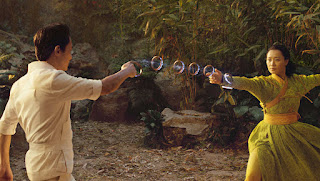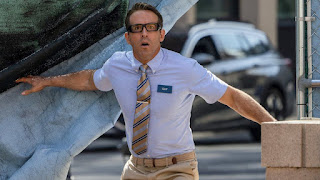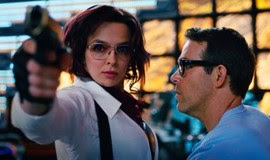Monday, September 27, 2021
Candyman 2021 Gives Horror Fans A Flawed But Faithful Sequel That's Both Chilling And Socially Conscious
Monday, September 20, 2021
Marvel's Shang-Chi And The Legend Of The Ten Rings Admirably Shows That Both Superheroes And Representation Do Matter
Whereas most comic book films are made with the sole purpose of entertaining audiences, there comes the rare few which carry the distinctive honor of being barrier-breaking films for both gender and cultural representation which Marvel's Shang Chi And The Legend Of The Ten Rings proudly carries. Although Black Panther represented a landmark for African-Americans in regards to exploring the origins of a black superhero while enriching black culture. Shang-Chi gives Asian representation that's wrapped around a solid origin story emerging from the Marvel Cinematic Universe.
Based on the popular Marvel comic, Shang-Chi's centers around Martial-arts master Shang Chi (Simu Liu) confronting the past he thought he left behind when he becomes drawn into the web of the mysterious Ten Rings organization. Shang Chi's plot bears a similar formulaic structure to Ryan Coogler's Black Panther with both stories repeating the same narrative regarding its main characters assuming their rightful titles with each films third act containing an epic climactic battle, which brings all of its key characters into play. Shang-Chi's story isn't one that's groundbreaking, but it makes the best use of familiar plot and characters beats without feeling like a generic Marvel film. The film admirably succeeds in breaking new cultural ground for the MCU without losing any of the thrilling action, witty humor, and heart that continuously makes the universe thrive with audiences. Shang-Chi succeeds in delivering a new kind of hero that's not only likable, but reinforces the studios commitment in pushing for diversity.
The performances from Chi's cast are terrific with its talented cast putting in stellar work that largely contributes to the believability of the MCU's story to audiences. Simu Liu excels as Shang, delivering a performance that makes audiences connect with his character on a human level. Awkwafina makes for a terrific sidekick as Chi's longtime friend Katy with the two sharing surprising buddy chemistry together. Tony Leung Chei-wai gives a scene-stealing performance as Chi's father Mandarin. Wai's role is powerful with him carrying both a strong physical and emotional presence, that steadily heats up throughout the course of the story. Meng'er Zhang also enormously impresses as Chi's biological sister Xialing with Zhang playing her character as being a tougher version of Scarlett Johansson's Natasha with her character bound to become an audience favorite. Fala Chen does well as Leiko Wu, though her character doesn't leave an impact on the film like Wai and Zhang's does due to them having more screentime. The rest of the cast contribute to bringing a sense of excitement and fun to the story with Michelle Yeoh leaving a noteworthy presence as Chi and Xialing's tough aunt Ying Nan, along with Benedict Wong in a hilarious performance as master of the Mystic Arts Wong. Ben Kingsley's reprises his role as Trevor Slattery, the goofy actor who pretended to be the Mandarin in Iron Man 3 with the character operating as being more of a court jester this time around. As a whole, Shang-Chi's cast play their roles to perfection with everyone giving the film the right amount of sincerity in its storytelling.
As for directing, Destin Daniel Cretton presents the right balance of superhero action and comedy. He makes the film visually breathtaking to watch with both its set and costume design giving off vibrant colors, that are enhanced by its stunning cinematography. The latter is most cleverly used in distinguishing between the cities and beautiful Ta Lo location with the Ten Rings headquarters being presented as darkly grim. The films pacing is rapid, making it fly by for its two hour length with action sequences that feel brisk. The score is carefully used in not only enhancing the emotional core of the story, but also emphasizing the main characters cultural heritage. The films action sequences are well-executed and brilliantly choreographed from the style of fighting with the Ten Rings members to Chi's mother and her community throwing down. Despite Shang-Chi being a martial arts driven story, the film doesn't heavily lean on those elements to make it engaging, and uses the action as a tool to assist in its storytelling with both the plot and character development placed front and center. As far as directing goes, Cretton deserves credit for keeping things well-balanced while understanding what audiences desire to see in a Marvel flick.
The script for Shang-Chi utilizes key subplots and character arcs from past Marvel flicks (Black Panther and Thor) with certain aspects of its scriptwriting feeling generic despite boasting a new plot. The films power comes from watching Chi reconnect with his estranged family with that aspect of the script letting the audience connect with the main character despite Mandarin's subplot walking a similar beat to Kilmonger's from Black Panther. The film delivers the trademark witty humor that generally accompanies Marvel-based films with the buddy relationship between Chi and Katy brilliantly meeting that requirement, along with funny bits from both Trevor and Wong's character. The films main theme is identity conflict with Chi only becoming fully powerful upon embracing his past. Although the writers attempt to sugarcoat its padding of the story by using formulas from other Marvel works, the films eagerness in being a barrier-breaker for Asian superheros is honorable. The story isn't innovative but it's handled well enough to where the audience supports the character of Shang along with enjoying the colorful side characters accompanying him on his quest.
While it can be said that the story-structure may feel a bit familiar to audiences, Shang-Chi succeeds in giving audiences an effects-driven extravaganza that leans heavily on Asian cultural themes regarding family that generate characters whom the audience can find themselves becoming connected to. The film takes familiar MCU themes such as loss, father issues, and learning to own one's power and apply them effectively in bringing another solid origin story to the screen. Like Black Panther and Captain Marvel before it, Shang-Chi eloquently demonstrates that representation matters and gives Marvel fans an experience that serves as empowering while staying true to the basic fundamentals of storytelling within the genre.
Final Verdict: For comic book fans, Shang-Chi And The Legend Of The Ten Rings Is A Must See.
Images courtesy of Disney
Monday, September 13, 2021
Don't Breathe 2 Fails To Capture The Suspense And Terror Of Its Predecessor
Monday, September 6, 2021
Free Guy Surprises As A Fun Action-Comedy With A Hilarious Performance From Ryan Reynolds
It's always a rewarding feeling when a film that doesn't look very good upon first glance from the trailers, ends up genuinely surprising with it's quality. It helps that the films charismatic lead is a reliable star in the action-comedy genre. With Free Guy, director Shawn Levy takes a concept that bears strong similarities to films like The Truman Show and Ready Player One and makes it feel fresh with Ryan Reynolds as the lead. Originally planned to be released in 2020, the film was delayed in release due to last years pandemic with the film now landing in theaters. Those wondering whether the film is any good will be pleased to hear that Free Guy is worth the wait as it not only surprises as a slick action-comedy, but puts a clever spin on its concept.
Free Guy's plot centers around a bank teller (Ryan Reynolds) discovering that he's actually a background player in an open-world video game. He then decides to become the hero of his own story in a version that he can rewrite himself. Free Guy's concept works as being an ideal vehicle for Reynolds given that it capitalizes on his hugely likable persona, while adding enough charm to make its plot appealing. Despite elements of its story feeling lifted from other films, Free Guy feels like solid Popcorn-filled entertainment that doesn't take itself seriously while serving as Bubble Gum for video game fans with its showcasing of impressive special effects while providing clever self-aware humor.
The key ingredient that makes Free Guy work is the charming performances by its main cast with Reynolds delivering a charming performance. He feels perfectly-casted in his role as Guy with his character feeling similar to that of Jim Carrey's from The Truman Show with him providing the heart and soul of the story. Giving Reynold's strong support is Jodie Comer as Guys love interest Millie Rusk/Molotov Girl. Comer is charming in her role with the two sharing likable chemistry. The rest of the supporting cast back the main leads with colorful characters, who are appealing in the story. Joe Keery shines as video game developer Walter, whose code was stolen from his creation titled Life Itself and used to develop the open world named Free City. Lil Rel Howery is fun to watch Guy's best friend and co-worker Buddy, whose oblivious to the fact that they're both background characters in a game world. Taika Waititi is effective as crooked video game developer Antoine, who tries to shut down both Guy and the game as well. Other noteworthy performances include Utkarsh Ambudkar as Walter's friend/partner in creating the latter's game world, and Channing Tatum in a hilarious cameo as an in-game Avatar. The performances from Free Guy's cast has much to do with why it's so enjoyable to watch with Ryan Reynolds being allowed complete freedom to put his charismatic presence on full display in a way that makes his character completely relatable and engaging.
On a technical front, director Levy gives the story the appropriate look and style which makes audiences believe that they're in the gaming world themselves. He gives the film an upbeat mood that makes the story feel both cheerful and energetic, while providing game-style violence consisting of typical shootouts, explosions, and car chases. Free City is given a crisp look with colors which not only give it a bright presence, but also a sense of heightened reality. That combined with the films set designs help direct the audience in knowing when they're in the real world and entering the game one. The film carries a strong sense of pacing with it knowing when to pause the action to develop the characters before presenting the next big action sequence. The soundtrack consists of unexpectedly fun songs that add to the hilarity of the plot with one example in particular being the inclusion of Mariah Carey's Fantasy being cleverly inserted with the pay-off being rewarding. On a directorial note, Levy does a fine job of crafting a story that feels like a love letter to gamers while making the experience exciting for audiences.
The screenwriting is serviceable with the films main issues stemming from the familiarity of its plot, including a heavy reliance on elements from previous films with similar concepts. Guy's character is presented as being paper-thin with him not carry much backstory, prompting Reynold's performance to help make him an effective lead. The plot often finds itself feeling formulaic though Guy's romantic subplot with Molotov girl is fairly well-established to where the audience does care about their dynamic. Other areas where the script showcases its strength are its attempts to be twisty in playing with both reality and fiction in a style similar to both The Truman Show and Last Action Hero. The moments involving the fleshing out of the key characters in between the action are where the film truly works such as the audience witnessing Guy's reaction to figuring out that he's a background character in Free City, along with him asking his friend Buddy about his feelings towards being an extra in a video game. Characters such as Antoine however, feel like cardboard cutouts from other films, but still manage to be serviceable thanks to the actors performances. Some of the scripts fun bits include pop culture references and hilarious twists such as Guy fighting a more muscular version of himself along with surprise cameos that'll thrill audiences. As a whole, Free Guy's writing is decent with the writers structuring a story that's not only energetic but speaks to gamers in a way that's thoroughly entertaining and ultimately enjoyable.
With Free Guy's plot, the film was always going to rely on its lead star to elevate it as solid popcorn entertainment, along with making his character relatable to audience. The filmmakers choose wisely with Ryan Reynolds giving the film the soul it needs with the action accompanying the story. Although it doesn't earn full points for creativity, Free Guy still delivers as a charming and sweet action-comedy that's made with a strong sense of appreciation for the gaming world, while providing audiences with an all-around good time that's largely attributed to its talented cast and Shawn Levy's skillful filmmaking in crafting an exciting frivolous experience for audiences.
Final Verdict: SEE IT
Images Courtesy Of Disney

























































